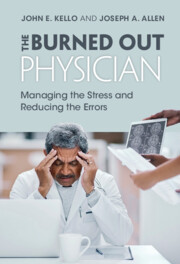Book contents
- The Burned Out Physician
- The Burned Out Physician
- Copyright page
- Dedication
- Contents
- Figures and Tables
- Preface
- Acknowledgments
- Chapter 1 The Psychology of Burnout
- Chapter 2 The Burned-Out Physician
- Chapter 3 Types of Medical Error
- Chapter 4 Sources of Medical Error
- Chapter 5 How-To Strategies for Addressing the Crisis
- Chapter 6 Solution #2: Engage in Self-Care
- Chapter 7 Solution #3: Seek Social Support
- Chapter 8 Solution #4: Follow the Advice You Would Give Patients
- Chapter 9 Solution #5: Perform Effective Team Leadership
- Chapter 10 Solution #6: Ensure Collaborating Team Members
- Chapter 11 Solution #7: Establish and Sustain a Positive Team Culture
- Chapter 12 Solution #8: Make Changes in Workflow in Organizations
- Chapter 13 Solution #9: Make Changes in Management Practices in Local Healthcare System Top Leaders
- Chapter 14 Solution #10: Make Changes in Overall Healthcare System Processes
- Chapter 15 Solution #11: Make Changes in National Healthcare
- Chapter 16 Saving the Burned-Out Physician
- Index
- References
Chapter 15 - Solution #11: Make Changes in National Healthcare
Published online by Cambridge University Press: 08 July 2022
- The Burned Out Physician
- The Burned Out Physician
- Copyright page
- Dedication
- Contents
- Figures and Tables
- Preface
- Acknowledgments
- Chapter 1 The Psychology of Burnout
- Chapter 2 The Burned-Out Physician
- Chapter 3 Types of Medical Error
- Chapter 4 Sources of Medical Error
- Chapter 5 How-To Strategies for Addressing the Crisis
- Chapter 6 Solution #2: Engage in Self-Care
- Chapter 7 Solution #3: Seek Social Support
- Chapter 8 Solution #4: Follow the Advice You Would Give Patients
- Chapter 9 Solution #5: Perform Effective Team Leadership
- Chapter 10 Solution #6: Ensure Collaborating Team Members
- Chapter 11 Solution #7: Establish and Sustain a Positive Team Culture
- Chapter 12 Solution #8: Make Changes in Workflow in Organizations
- Chapter 13 Solution #9: Make Changes in Management Practices in Local Healthcare System Top Leaders
- Chapter 14 Solution #10: Make Changes in Overall Healthcare System Processes
- Chapter 15 Solution #11: Make Changes in National Healthcare
- Chapter 16 Saving the Burned-Out Physician
- Index
- References
Summary
At the broadest systems level, there are several possible national healthcare systems. Hypothetically, there might be a free-market approach to healthcare, in which there would be little or no government regulation. No country has implemented such a system, and even if it were possible, it is not clear that burnout risk to healthcare providers would be reduced. More familiarly, the socialized medicine approach is implemented in many parts of the world. Such a system, in which the government provides healthcare, free to the patient and paid for by taxes, has many well-known pros and cons. The hybrid system, as seen in the United States, combines elements of the free-market and the socialized medicine approaches, and also has its pros and cons. There is growing interest in so-called universal healthcare, which tilts the hybrid system a bit more in the direction of socialized medicine. As with the other national system options, there is no clear-cut impact on burnout with universal healthcare. At present, no existing national healthcare system is structured to reduce burnout among healthcare providers.
Keywords
- Type
- Chapter
- Information
- The Burned Out PhysicianManaging the Stress and Reducing the Errors, pp. 190 - 198Publisher: Cambridge University PressPrint publication year: 2022



